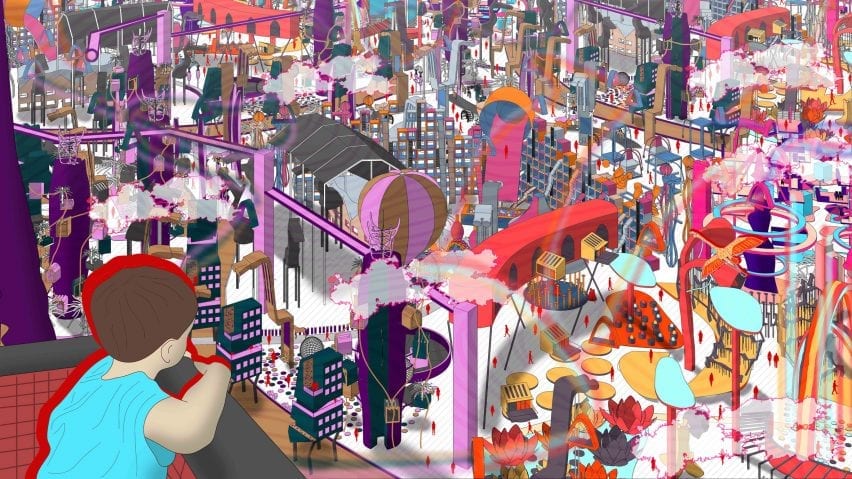
Manchester School of Architecture spotlights 11 student projects
A project exploring whether dreams could influence the design process in architecture and a "vertical village" that adapts to rising sea levels are included in our latest school show by students at the Manchester School of Architecture.
Also included is a neighbourhood plan informed by how children experience space and a sustainable community project with a core purpose to connect people through buildings.
Manchester School of Architecture
School: Manchester School of Architecture at the Manchester Metropolitan University and The University of Manchester
Courses: Master of Architecture, Master of Landscape Architecture and Master of Arts in Architecture and Urbanism
Tutors: Sally Stone, Becky Sobel, Luca Csepely-Knorr and James Robertson
School statement:
"Alongside the seven Master of Architecture (MArch) design-led studios, the Manchester School of Architecture's digital exhibition also introduces the course's professional studies, research and dissertations modules – Master of Landscape Architecture (MLA) and Master of Arts in Architecture and Urbanism (MA A+U).
"The MSA postgraduate programmes are proud of its northern roots – to be situated in the heart of Manchester and part of the ever more influential northern powerhouse. The MArch ateliers also have strong international connections – whether these are collaborations with remote universities, competitions in foreign climates and projects focused on various cultures.
"Debate and discussions centred around climate change is embedded in the academic curriculum of the postgraduate programme. Differences in climate, locations and needs are explored. The necessity to address climate change is a fundamental part of the programmes. It is something that all students need to embrace and fight for while developing creative methods to address it."
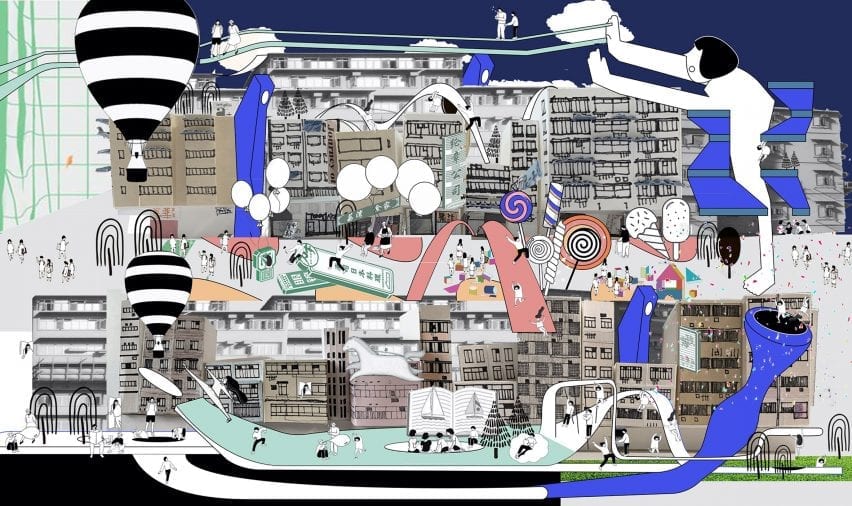
Urban Space for Urban Childhood by Veronica Wong
"Covid-19 has amplified long-standing inequalities across the globe. Atelier &rchitecture seeks to understand the potential for architects to affect positive change through inclusive and engaged practices.
"Students developed individual thesis projects based on an issue, cause or consequence of social exclusion that interests them. They developed non-linear, productive and iterative design research methodologies, ranging from physical prototyping to augmented reality games.
"As part of the programme, Veronica Wong's thesis stands for empowering children's voice to be heard and their ideas to be 'seen'. The project establishes direct engagement with children to investigate their experience of their neighbourhood. More than 140 children (from different backgrounds) participated in the research, which resulted in Wong developing a neighbourhood plan based on how the children experienced the space. The image represents the investigation and design process, and a video can be watched here."
Student: Veronica Wong
Course: MArch Atelier &rchitecture
Course Leader: Mark Hammond
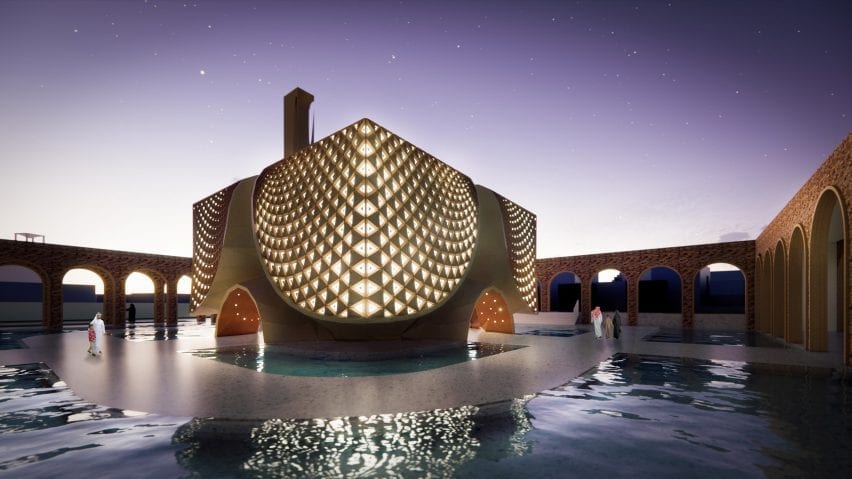
The Cymatics Revival by Zakaria Islam/strong>
"This atelier is conceived as a think tank and testbed – a platform for research and experimentation in architectural design, concerned with holistic understandings of design and sustainability in light of the climate emergency.
"Islam Zakaria investigates the 'Revive the Spirit of Mosul' located in The city of Mosul. Meaning "the linking point" in Arabic, it is one of the oldest cities in the world. Due to its strategic location, it became home to many people from diverse backgrounds, ethnicities and religious beliefs. However, this unique location also made it a target for ISIL/Daesh. In 2014, the Islamic State took the city and three devastating years (from 2014 to 2017) of occupation passed before the shackles of violent extremism could end.
"By rehabilitating the historical Nouri complex, Zakaria intended to revive its spirit through investigating acoustics. Using Ayah 22 from Surah al-Baqarah from the Holy Qur'an, a verse about how Allah (God of Islam) is here, even when there is a hardship. The reverberation and resonance generated from the recitation were used to augment anomalies – a complex algorithm simulating atomic collision physics. This created a four-dimensional multi-faceted shape that connects the mind and soul."
Student: Zakaria Islam
Course: MArch Atelier Advanced Practice
Course Leaders: Matt Ault and Amy Hanley
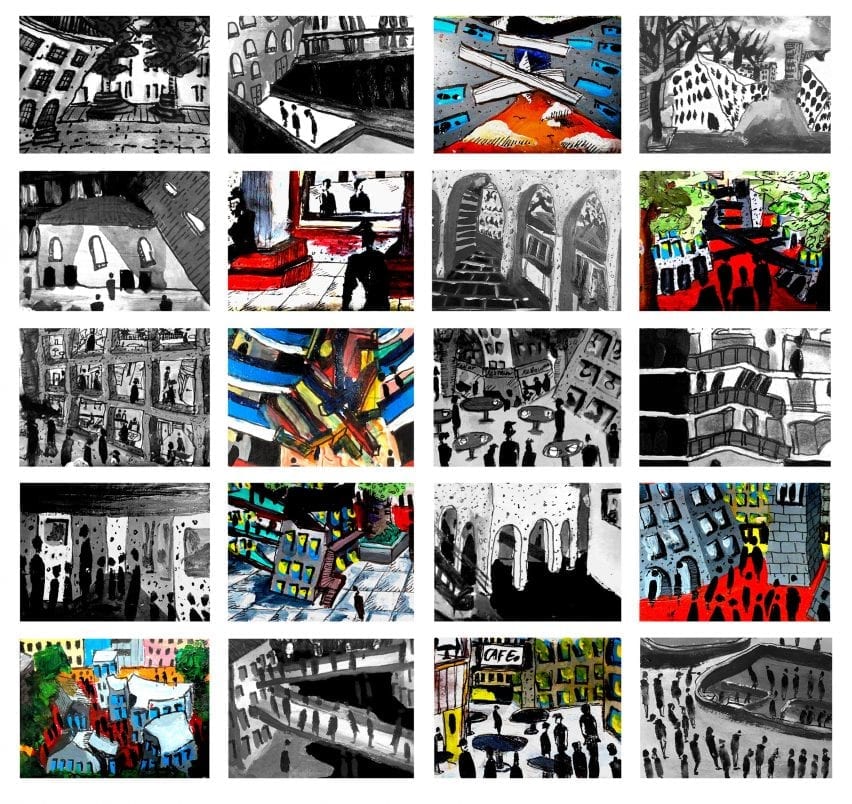
Design as a Process - New Compositions: Contentious Heritage by Tahreem Amjad
"The Continuity in Architecture atelier believes that the city is an exciting, complex and crowded place, full of contrast, juxtaposition, discord and contradiction. We believe that the constructed environment is charged with narrative content, that it is a place in which certain elements come to the fore, while others are more modest but no less important or carefully considered.
"Contentious Heritage is part of the atelier and it addresses the negative histories of the built environment and focuses on how we can incorporate these histories into the development of new design. Encouraged by this, Tahreem Amjad's thesis represents foreign identities in Manchester's urban fabric after looking into the issues surrounding institutional discrimination of foreign bodies in the city.
"Amjad based the project around Manchester's Italian community due to their positive integration into Manchester in the late 1800s and the clear discrimination they felt during the war. The rich architectural composition of Manchester's Aytoun Street was selected for experimentation.
"It concluded that communication and education are necessary components in understanding the extent of British heritage and history. This was translated into architectural spaces through drawing, painting and stitching. Through this process, a collection of buildings emerged. This thesis comments on the importance of memorialising tragedy, educating others about the negative aspects of history and using that information to move forward."
Student: Tahreem Amjad
Course: MArch Atelier Continuity in Architecture
Course Leader: Laura Sanderson
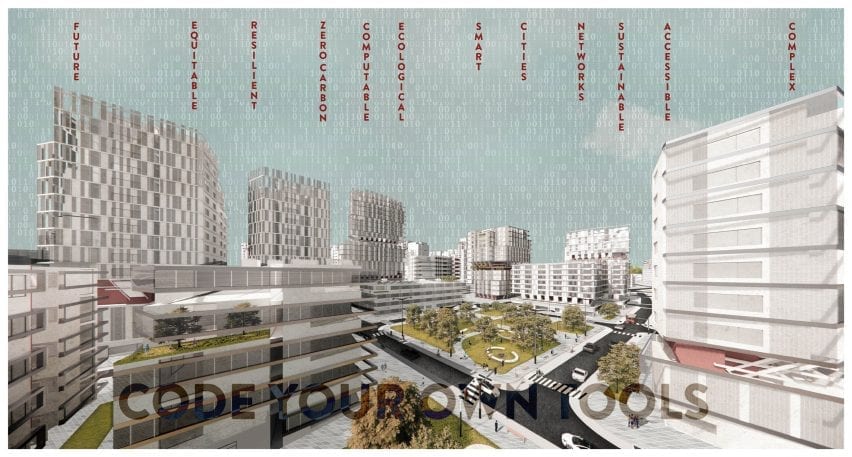
Gateway to Zero-carbon City: a custom-built generative and analytical tool to explore design pathways to a zero-carbon future city by Yan Chen, Yirui Chen and Linyu Li.
"[Complexity Planning & Urbanism]ai uses a complexity framework to develop a new design science approach referencing systemic forms of design (R. Buckminster Fuller) and the study of design/the artificial (Herbert Simon). This year [CPU]ai explores 'resilient urban futures' from multiple sustainability perspective.
"A collaborative project by Yan Chen, Yirui Chen and Linyu Li, Zero-carbon City used a generative approach to resolve the contradictory correlation among morphological compactness, building solar optimisation and green space distribution to design a zero-carbon northern gateway. The generative tool aims to minimise building energy demand and enhance solar energy utilisation to respond to the challenge brought out by Manchester City Council and Northern Gateway developers."
Student: Yan Chen, Yirui Chen and Linyu Li
Course: [Complexity Planning & Urbanism]ai
Course Leaders: Ulysses Sengupta and Rob Hyde
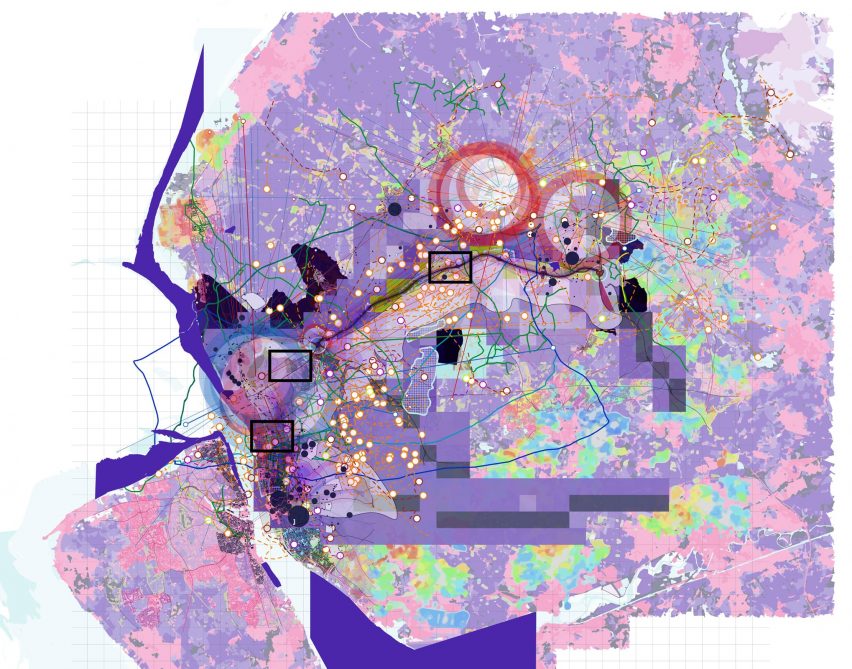
Composite mapping by Julia Arksa, Joe Copley, Remi Phillips-Hood and Tom Register
"Infrastructure Space uses large territories and novel mapping techniques to explore space, approaching it with neutrality to form objective views of how it is produced and used. This year the territory under investigation was the M58 motorway corridor that connects the M6 with Liverpool's docks.
"The students developed research questions based on preliminary group studies that considered digital connectivity, urban-rural dynamics, planning policy and complexity, flooding and water scarcity, density and dispersion, and infrastructural economies. Thesis projects typically explored conditions such as these and then speculated on the potential spatial and material outcomes.
"As the City of Liverpool and the Merseyside area begin to grow in population, there is an opportunity to readdress some of the issues that the post-war developments fell short of.
"Redistributing the balance of the city region as the city embarks on a period of urban renewal could help to reenergise areas of the site that are segregated from the socio-economic shifts taking place. The wider city region is at a point of reinventing itself, making it an opportune time to seek alternative ways of achieving urban renewal aside from market lead growth."
Student: Julia Arksa, Joe Copley, Remi Phillips-Hood and Tom Register
Course: MArch Atelier Infrastructure Space
Course Leader: Richard Brook
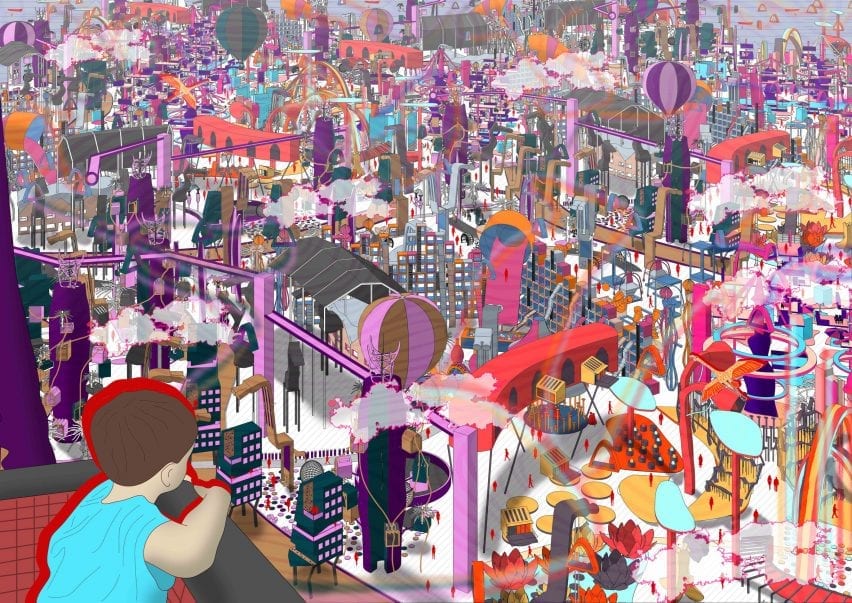
View over the City by Rachael Aylward-Jones
"Praxxis is an all female-led feminist studio atelier and research collective. It takes an explicitly feminist approach. In particular, intersectional feminism explores the inequalities in society and what that may mean for the built environment.
"Intersectionality acknowledges that the various layers of what we see as social and human characteristics – class, race, sexual identity, religion, age, disability, marital status and gender identity do not exist separately from each other but are interwoven in a complex matrix.
"For the year-long thesis project, our students use feminist tools as a way of constructing project briefs that always respond to the personal and the political each project explores inclusive understandings of how our identity affects our life and our work.
"This thesis explores whether dreams could influence the design process within architecture to enable greater creative involvement from both the public and architects. Here everybody explores their unique struggles and aspirations for space within their dreams and utilising them could be the key to fulfilling our subconscious wants, needs and desires.
"To test the effectiveness of dreams as a design process and source of design inspiration, Rachael Aylward-Jones explored her dreams and created a deeply personal methodology to utilise every aspect of the dreams, influencing the project from concept to detailed design.
"This process was the creation of a Feminist Dream City that provides equitable fun and empowerment for residents. When people become true feminist, in reality, they are granted access to the dream city when they sleep. As a community of feminists take residence and continue to add to the city, it begins to multiply and expand, sparking chaos and excitement."
Student: Rachael Aylward-Jones
Course: MArch Atelier Praxxis
Course leader: Helen Aston
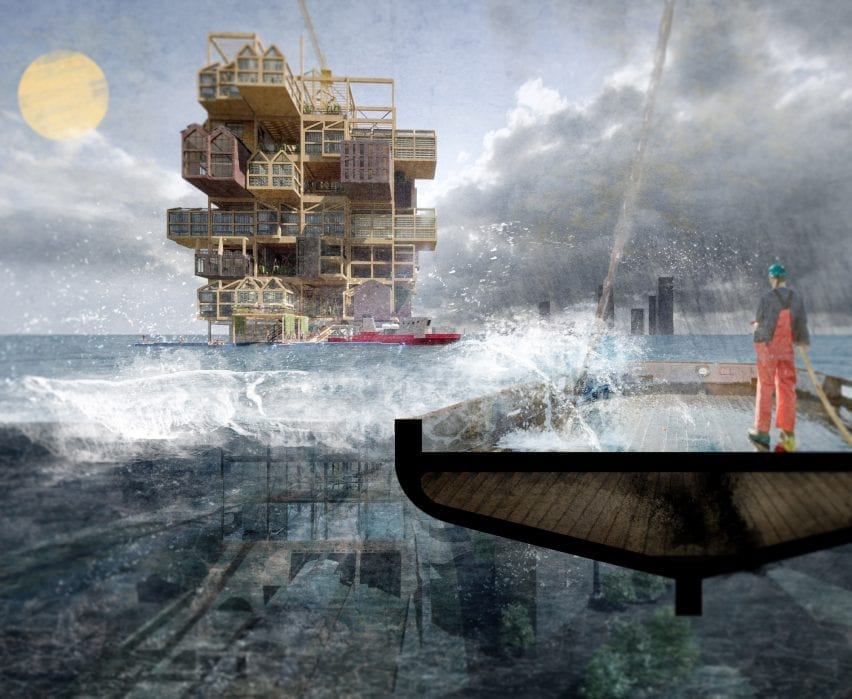
Rising Tides by James Robinson
"This atelier explores the boundaries of architectural practice and uses the techniques and working methods of other creative disciplines (in particular fine art). This year's topic was to develop projects and spatial strategies that explored resistance. This theme ran throughout the atelier in all cohorts.
"Led by thorough research, student proposals included bird sanctuaries, workshops, bathhouses, and art galleries. All solutions were encouraged to adopt sustainable technologies whilst maintaining a poetic and artistic approach within their narrative. Each project used experimental methodologies to create solutions to their developed brief and sought to enhance the landscape of the reservoir setting whilst furthering USE atelier values.
"With the current climate disaster outcome too complex to predict, current architecture needs to prepare for an uncertain future. This thesis project explores how climate change will affect the world in the worst-case scenario sea-level rise of 82 metres and developed an alternative way to look at urban skyscraper architecture due to mass migration to the north of Europe due to the disaster. A masterplan for a metabolic vertical village was developed for Manchester, including key components that allowed it to be self-sustainable and encourage community interaction, as well as being adaptive to the rising sea levels and the needs of the village."
Student: James Robinson
Course: MArch Atelier Urban Spatial Experimentation (USE)
Course Leader: Becky Sobell
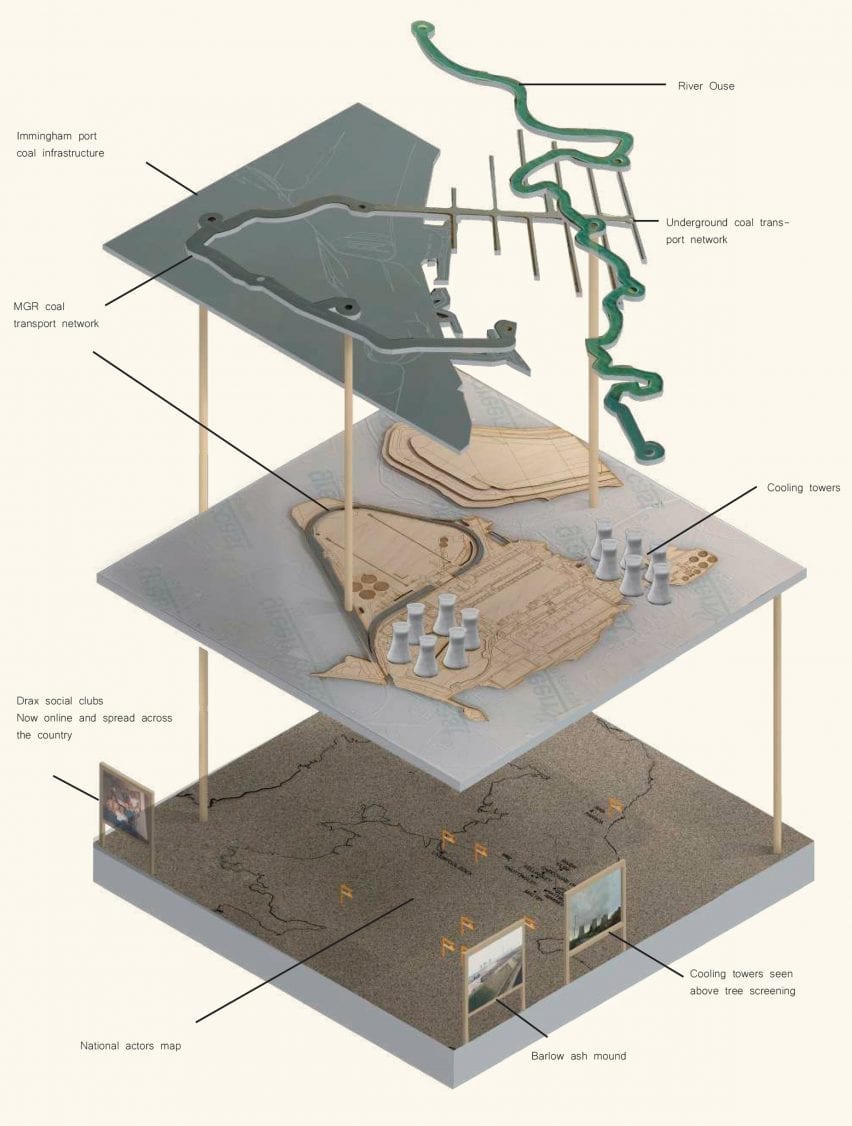
Model of Drax Power Station and its networks by Ellen Faulkner, Cameron Smith, Madhumitha Babu, Christy Chu, Eunice Ng and Anubhav Rana
"The research one: methods workshop is a taught programme introducing first-year master students to research in architecture, developing methodological and conceptual capabilities that apply to the disciplines of architecture.
"The subject of the different workshops reflects the symbiosis between design practice and history and theory and allow for scholarship within individual specialisms to be placed within a deeper understanding of architecture as a whole.
"The course focussed on the interconnected infrastructural landscapes of the Yorkshire coalfield, addressing issues of transitioning from carbon economies and the relation between power generation and climate change. Using archive materials, field study, interviews and desktop research, the students produced analytical case studies that synthesised information through mapping, diagramming and model making.
"In this case, looking at Drax coal-fired power station, the student group asked the question: what impact did Drax have on the wider network at varying scales, and how might this have influenced its design? The model shown here investigates the infrastructural networks that combined to enable power generation at Drax in its local, regional and international contexts."
Students: Ellen Faulkner, Cameron Smith, Madhumitha Babu, Christy Chu, Eunice Ng, Anubhav Rana
Course: Research one and two – methods and dissertation
Course Leaders: Lea-Catherine Szacka and Stephen Walker
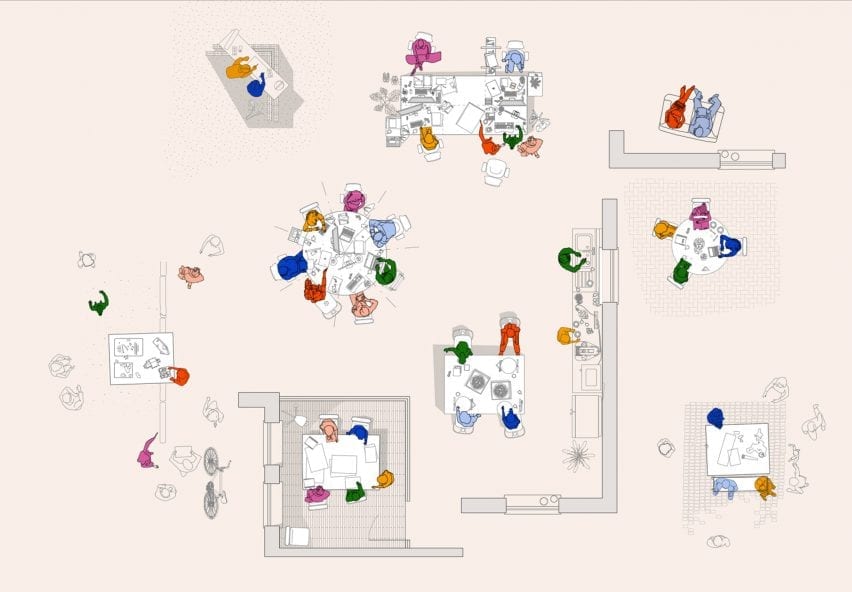
Everything and the Kitchen Sink by Proto-practice: Lorenzo la Magna Zimmerman, Harry Westwood, Sally Lofthouse, Kiran Milton, Freya Cooper Williams, Angus Riddell and Martha Hiles
"At part two (MArch) level, Professional Studies ensures that students have the opportunity to evidence how they have gained knowledge of the industries, organisations, regulations and procedures involved in translating design concepts into buildings and integrating plans into overall planning. Through a series of lectures by staff and practising experts, the students gain a better understanding of the professional world of architecture before demonstrating how they can apply that to their projects.
"This year, the students relished the opportunity to review a previous studio project and discuss how they could improve it with their enhanced knowledge. They also formed a theoretical practice to showcase how they might put a business together and benefit from current or future trends in construction and design, often reaching beyond the traditional practice model.
"The co-operative Proto-practice set up Everything and the Kitchen Sink as part of their professional studies module and actively chose to take a feminist approach to practice management. The team worked closely together, creating a robust and accessible identity for the network, ensuring their ethos was centred around providing social viability and 'everything' when it comes to architecture, design and research projects.
"The team designed a toolkit to ensure this social value was effectively delivered to the clients and communities at every RIBA stage with a strong emphasis on collaboration and participative consultation. The practice structure developed over a hypothetical time frame of ten years from a group of friends at university operating as a collective, progressing to a community interest company and eventually forming a co-operative."
Students: Proto-practice: Lorenzo la Magna Zimmerman, Harry Westwood, Sally Lofthouse, Kiran Milton, Freya Cooper Williams, Angus Riddell and Martha Hiles
Course: Professional Studies
Course Leader: Stephen McCusker
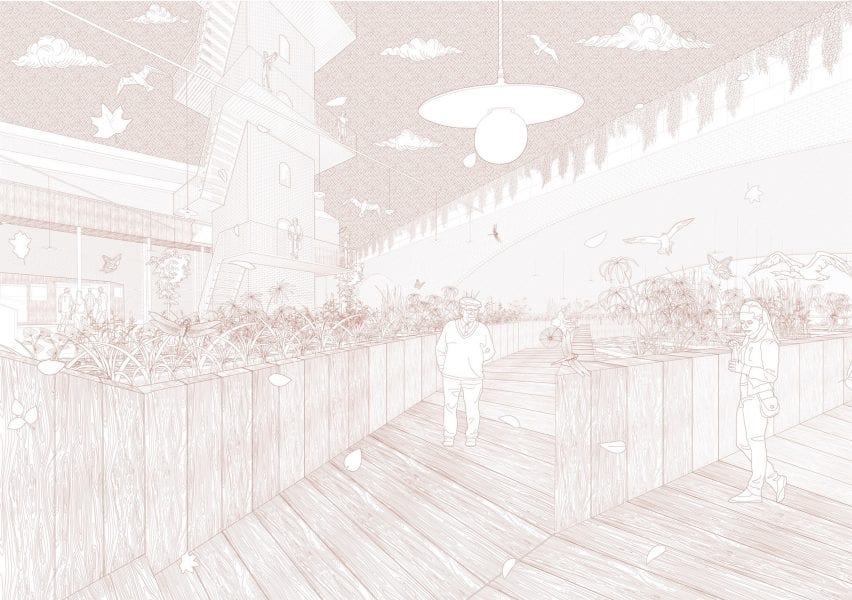
Manifesting Manchester's historical relationship to slavery and black liberation through a metaphorical sequence of spaces expressing stages on the journey from enslavement to freedom by Jakir Noor
"Landscape architecture has an immense amount to offer as a stitcher-together of communities, ecologies, and places. This year we implemented several changes to our course. First, we brought landscape architecture and architecture students together through research, live projects, and the MSA atelier system. Second, we aim to afford a dialogue between built environment professions, encouraging mutual learning, respect, debate, and cooperation.
"In Jakir Noor's project, the River Medlock is a symbol of black history – neglected, ignored and forgotten. Experiential landscape architecture was brought forward in this project, getting back to life the river itself and the black history of Manchester. The Trans-Atlantic slave trade was the basis of this journey along the river. Five different sites were assigned a typology based on the emotions felt in the existing spaces.
"These emotions are linked to the feelings experienced in this infamous period. Chronologically the typologies include fear and anxiety, assimilation, grief, rebellion and escape. Each typology provides an evocative, experiential space that aims to educate black history in Manchester whilst serving the black community from a health and social point of view."
Student: Jakir Noor
Course: Master of Landscape Architecture
Course Leaders: Becky Sobel and Luca Csepely-Knorr
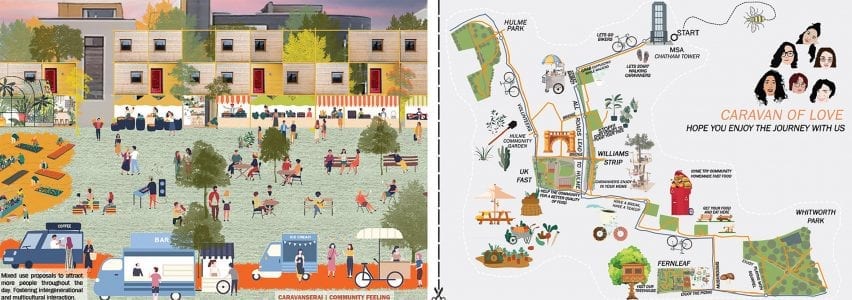
Workhouse project by Mariana Camacho Gonzalez, Xiao Chen, Lauren Fearon, Kisanet Goitom, Athina Ioannidou-Lemonidou and Jiaqi Wei
"The research offering this year focused on six optional projects exploring a plethora of urban issues in a variety of locations. In addition to local territories in Manchester and Trafford, other settings were examined in Stoke-on-Trent, Wolverhampton, Crewe, and further afield in Barahona de Fresno, Spain, resulting in a range of proposals through which students learn as a group about the transformative potential of urban design.
"The introduction of a second cohort, coupled with students spending much of the year in their home cities, has led to an incredibly varied range of thesis projects and dissertation topics with a notably international agenda – from the future of historic city quarters in China to issues of the provision of homes and planning concerns in the UK.
"Here a co-operative group of students created a vision for The WorkHouse Project – a community interest company based in Hulme and Moss Side, to create a sustainable community at its heart. The students planned a scheme that had as its core purpose the connection of local people, mentally and physically, through linking key principal sites for community use and public spaces."
Students: Mariana Camacho Gonzalez, Xiao Chen, Lauren Fearon, Kisanet Goitom, Athina Ioannidou-Lemonidou and Jiaqi Wei
Course: Master of Arts in Architecture and Urbanism
Course leader: James Robertson
Partnership content
This school show is a partnership between Dezeen and Manchester School of Architecture. Find out more about Dezeen partnership content here.